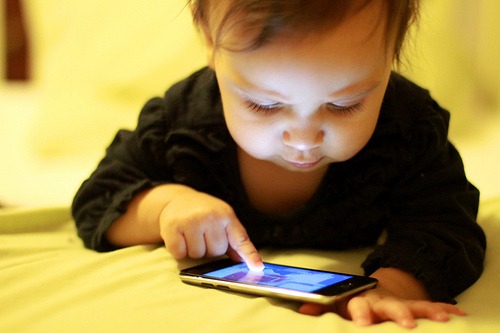
Toddlers and Technology
Drawing A Line From Ernie and Bert To Steve Jobs:
An award winning author and expert on early learning talks with All My Children about Toddlers and Technology
By Rob Starr
Susan Magsamen is SVP of Early Learning at Houghton Mifflin Harcourt and also serves as a Senior Advisor to the Science of Learning Institute and the Brain Science Institute at Johns Hopkins University. She works on early learning, creativity, the arts, and family engagement and recently took some time to talk with All My Children Daycare about a healthy digital diet and appropriate screen time for children.
“Technology is not the be-all and end-all in early learning,” she said. “It is a tool that can be leveraged to help strengthen developmental, cognitive and academic skills that in turn create a foundation for positive, engaging learning experiences. ”
She explains technology can teach children how to self-regulate their time and pay attention to what’s in front of them more closely.
Working Memory
“When you can attend more closely to anything, you have the ability to learn at a greater capacity,” Magsamen says adding that building working memory is another skill that comes with responsible use of everything from iPads to televisions. Working
memory, like the name suggests, is about pulling up information and using it as a tool to make decisions and be creative. Magsamen, Chair of the Center for Innovation and Leadership in Special Education at the Kennedy Krieger Institute, also writes in a recent blog about hundreds of learning games, story apps and eBooks released weekly and how to pick the ones that are best for your child.
While experts agree there are really no hard and fast rules about screen time for younger children, The American Pediatrics Association draws their line at two hours a day. Magsamen suggests in her blog how to make that time more educational, age appropriate and positive.
Templates
She stresses establishing guidelines is especially critical when their brains are developing.
“At the same time they are building new skill sets, young children are also developing neural pathways and wiring cells and synapses to make the brain’s connections even stronger,” she says adding neural development is essential for increasing brain capacity.
This focus on building skills provides avenues for the content emerging on the internet today, according to Magsamen. However, she stresses math, language and literacy, science and other types of academic content are only part of a healthy balance that’s available to families.
Physical Development
“Academic content needs to be combined with health, wellness and physical development. That has to be a strong part of the mix.” Magsamen also draws a historical line to the origins of teaching children with technology.
“Technology literacy for young children is very important,” she says. “Sesame Street used it in the very beginning because the founder of that program thought that if you could sell laundry detergent on television, why can’t you be sharing information about learning?”
Read more info like this at All My Children.

Hellow it’s my first visit
Hi
I have a son who is autistic. I think I have overdone it with him. He is forever glued on the screen. His mums phone is his. If no phone he is on the telly. Best thing is that though he got some grounding from an occupational therapist, he is practically self taught and surprises us the things he does.
Where would I find content to help him. We arent that well off but would want the best for hu s development. Am from Kenya and not much has been developed here. He is turning 7 in April 17
Will appriciate your advice
Sam